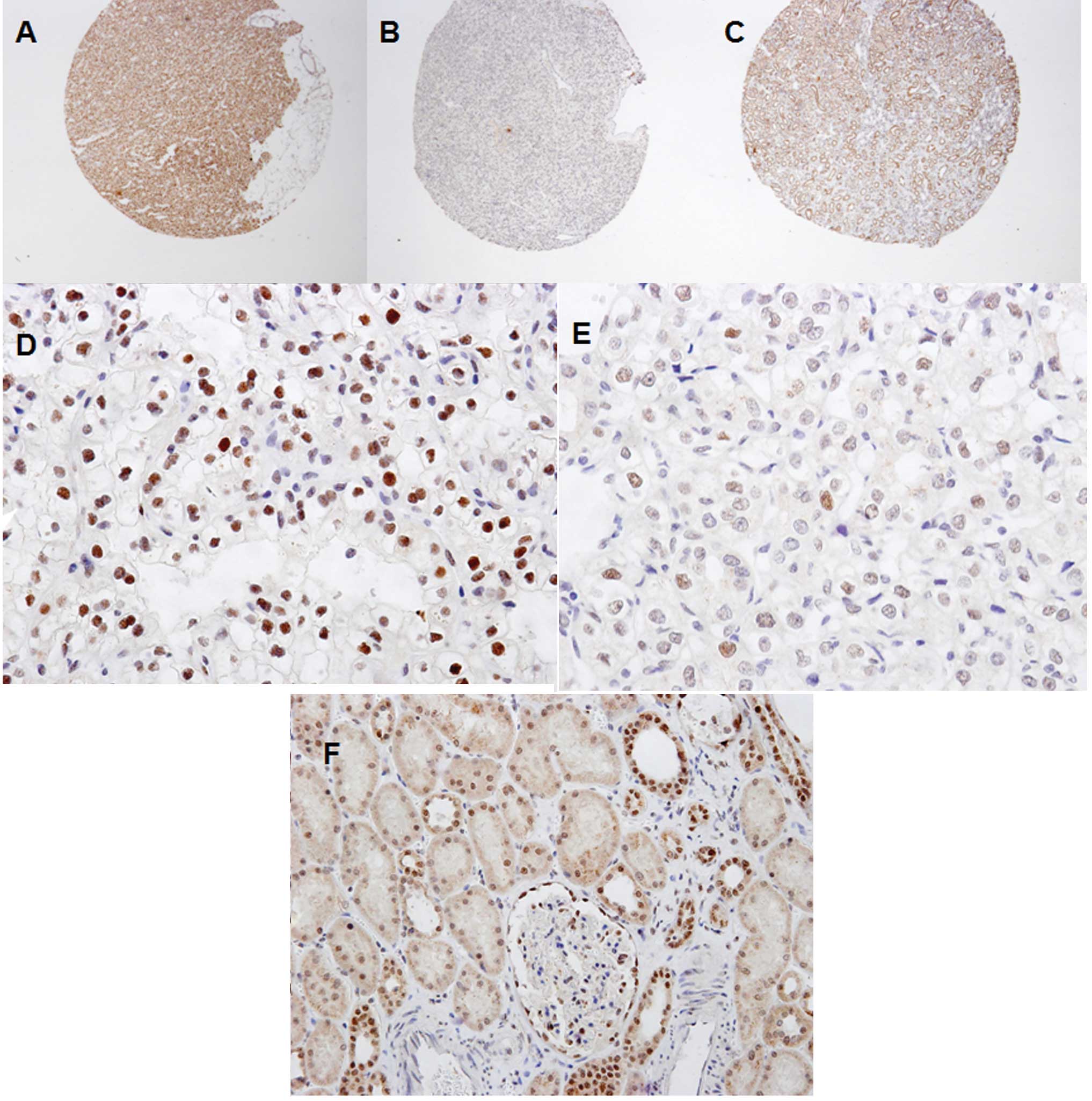|
1
|
Siegel R, Naishadham D and Jemal A: Cancer
statistics, 2013. CA Cancer J Clin. 63:11–30. 2013.
|
|
2
|
Kim H, Cho NH, Kim DS, et al: Renal cell
carcinoma in South Korea: a multicenter study. Hum Pathol.
35:1556–1563. 2004.
|
|
3
|
Rini BI, Campbell SC and Escudier B: Renal
cell carcinoma. Lancet. 373:1119–1132. 2009.
|
|
4
|
Figlin R, Sternberg C and Wood CG: Novel
agents and approaches for advanced renal cell carcinoma. J Urol.
188:707–715. 2012.
|
|
5
|
Audenet F, Yates DR, Cancel-Tassin G,
Cussenot O and Rouprêt M: Genetic pathways involved in
carcinogenesis of clear cell renal cell carcinoma: genomics towards
personalized medicine. BJU Int. 109:1864–1870. 2012.
|
|
6
|
Bibikova M, Lin Z, Zhou L, et al:
High-throughput DNA methylation profiling using universal bead
arrays. Genome Res. 16:383–393. 2006.
|
|
7
|
Yoo KH, Park YK, Kim HS, Jung WW and Chang
SG: Epigenetic inactivation of HOXA5 and MSH2 gene in clear cell
renal cell carcinoma. Pathol Int. 60:661–666. 2010.
|
|
8
|
Peltomäki P: Role of DNA mismatch repair
defects in the pathogenesis of human cancer. J Clin Oncol.
21:1174–1179. 2003.
|
|
9
|
Marsischky GT, Filosi N, Kane MF and
Kolodner R: Redundancy of Saccharomyces cerevisiae MSH3 and MSH6 in
MSH2-dependent mismatch repair. Genes Dev. 10:407–420. 1996.
|
|
10
|
Frank I, Blute ML, Leibovich BC, Cheville
JC, Lohse CM and Zincke H: Independent validation of the 2002
American Joint Committee on cancer primary tumor classification for
renal cell carcinoma using a large, single institution cohort. J
Urol. 173:1889–1892. 2005.
|
|
11
|
Won KY, Kim HS, Sung JY, et al: Tumoral
FOXP3 has potential oncogenic function in conjunction with the p53
tumor suppressor protein and infiltrated Tregs in human breast
carcinomas. Pathol Res Pract. 209:767–773. 2013.
|
|
12
|
Kouso H, Yoshino I, Miura N, et al:
Expression of mismatch repair proteins, hMLH1/hMSH2, in non-small
cell lung cancer tissues and its clinical significance. J Surg
Oncol. 98:377–383. 2008.
|
|
13
|
Uehara H, Miyamoto M, Kato K, et al:
Deficiency of hMLH1 and hMSH2 expression is a poor prognostic
factor in esophageal squamous cell carcinoma. J Surg Oncol.
92:109–115. 2005.
|
|
14
|
Olasz J, Mándoky L, Géczi L, Bodrogi I,
Csuka O and Bak M: Influence of hMLH1 methylation, mismatch repair
deficiency and microsatellite instability on chemoresistance of
testicular germ-cell tumors. Anticancer Res. 25:4319–4324.
2005.
|
|
15
|
Herman JG and Baylin SB: Gene silencing in
cancer in association with promoter hypermethylation. N Engl J Med.
349:2042–2054. 2003.
|
|
16
|
Herman JG, Graff JR, Myöhänen S, Nelkin BD
and Baylin SB: Methylation-specific PCR: a novel PCR assay for
methylation status of CpG islands. Proc Natl Acad Sci USA.
93:9821–9826. 1996.
|
|
17
|
Walsh CP, Chaillet JR and Bestor TH:
Transcription of IAP endogenous retroviruses is constrained by
cytosine methylation. Nat Genet. 20:116–117. 1998.
|
|
18
|
Cui H, Cruz-Correa M, Giardiello FM, et
al: Loss of IGF2 imprinting: a potential marker of colorectal
cancer risk. Science. 299:1753–1755. 2003.
|
|
19
|
Xu GL, Bestor TH, Bourc’his D, et al:
Chromosome instability and immunodeficiency syndrome caused by
mutations in a DNA methyltransferase gene. Nature. 402:187–191.
1999.
|
|
20
|
Jones PA and Baylin SB: The fundamental
role of epigenetic events in cancer. Nat Rev Genet. 3:415–428.
2002.
|
|
21
|
Martin-Subero JI, Ammerpohl O, Bibikova M,
et al: A comprehensive microarray-based DNA methylation study of
367 hematological neoplasms. PLoS One. 4:e69862009.
|
|
22
|
Vlaykova T, Mitkova A, Stancheva G, et al:
Microsatellite instability and promoter hypermethylation of MLH1
and MSH2 in patients with sporadic colorectal cancer. J BUON.
16:265–273. 2011.
|
|
23
|
Lynch HT and de la Chapelle A: Hereditary
colorectal cancer. N Engl J Med. 348:919–932. 2003.
|
|
24
|
Nagasaka T, Rhees J, Kloor M, et al:
Somatic hypermethylation of MSH2 is a frequent event in Lynch
Syndrome colorectal cancers. Cancer Res. 70:3098–3108. 2010.
|
|
25
|
Ling ZQ, Zhao Q, Zhou SL and Mao WM: MSH2
promoter hypermethylation in circulating tumor DNA is a valuable
predictor of disease-free survival for patients with esophageal
squamous cell carcinoma. Eur J Surg Oncol. 38:326–332. 2012.
|
|
26
|
Skeldon SC, Semotiuk K, Aronson M, et al:
Patients with Lynch syndrome mismatch repair gene mutations are at
higher risk for not only upper tract urothelial cancer but also
bladder cancer. Eur Urol. 63:379–385. 2013.
|
|
27
|
Stoehr C, Burger M, Stoehr R, et al:
Mismatch repair proteins hMLH1 and hMSH2 are differently expressed
in the three main subtypes of sporadic renal cell carcinoma.
Pathobiology. 79:162–168. 2012.
|
|
28
|
Chen HC, Bhattacharyya N, Wang L, et al:
Defective DNA repair genes in a primary culture of human renal cell
carcinoma. J Cancer Res Clin Oncol. 126:185–190. 2000.
|
|
29
|
Leach FS, Koh M, Sharma K, et al: Mismatch
repair gene mutations in renal cell carcinoma. Cancer Biol Ther.
1:530–536. 2002.
|
















